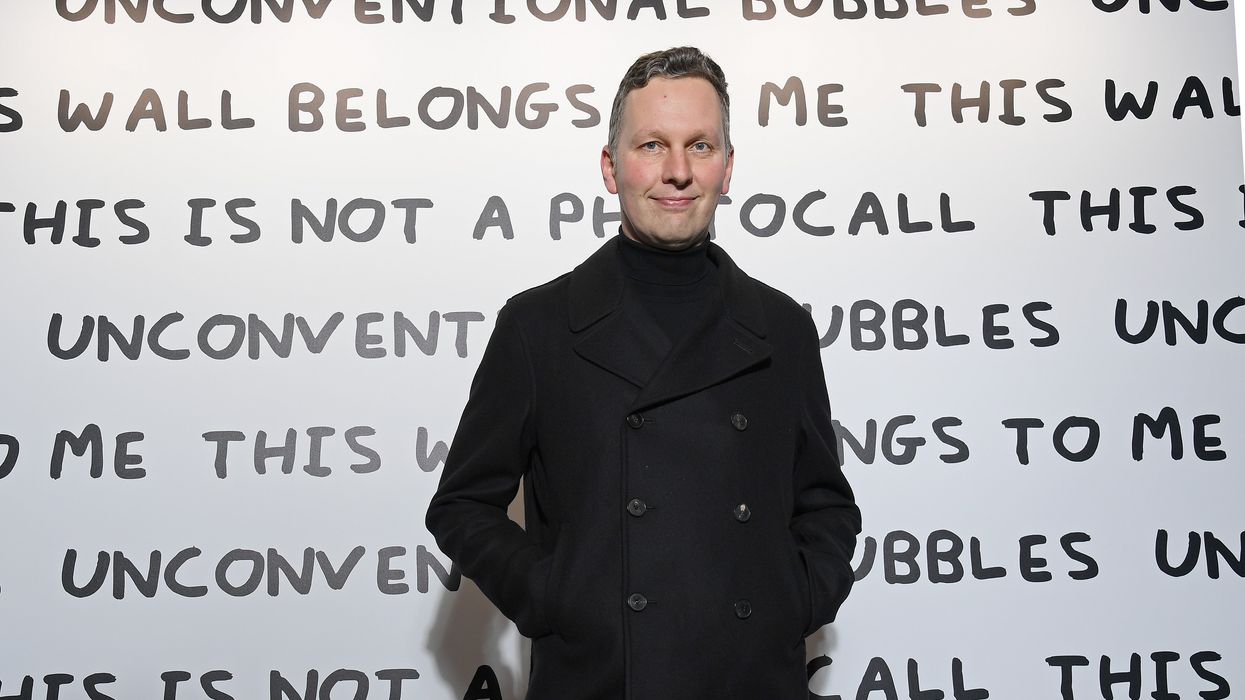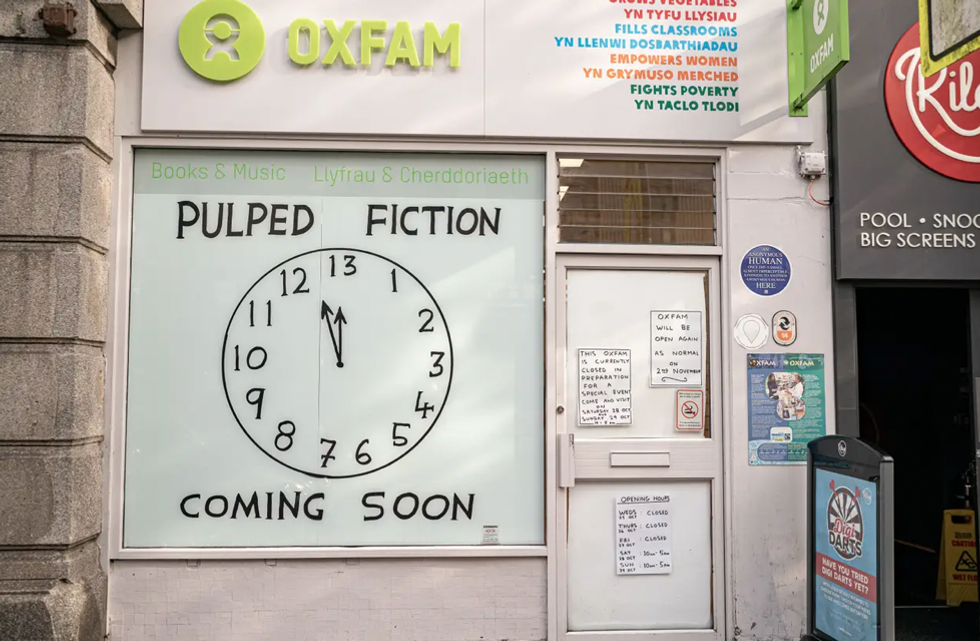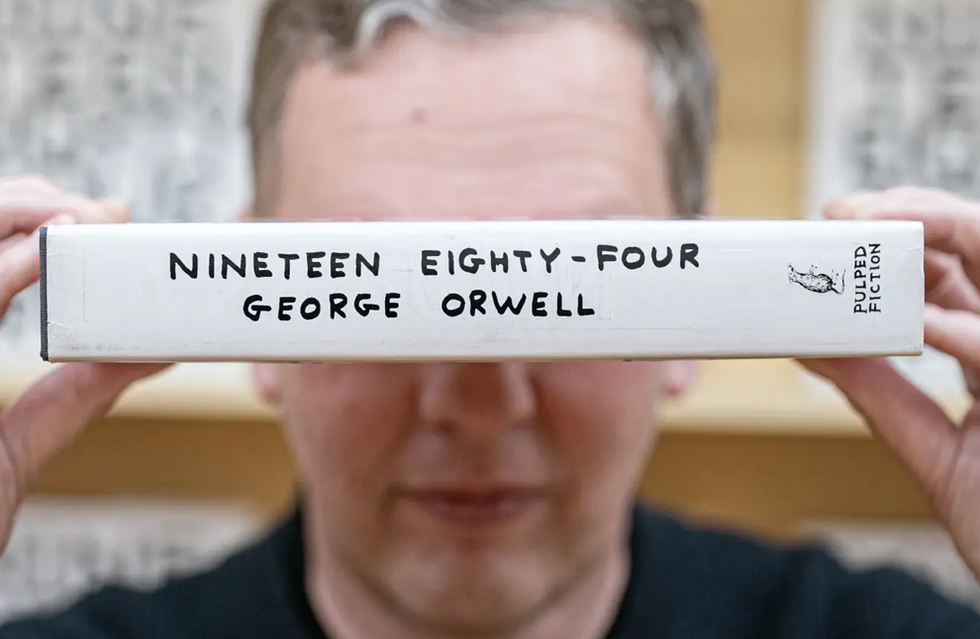Becca Monaghan
Oct 26, 2023

Getty Images
British artist David Shrigley has created over 1,000 new editions of George Orwell’s dystopian novel 1984 using second-hand copies of The Da Vinci Code.
The 55-year-old's inspiration for his project 'Pulped Fiction' came after an Oxfam charity shop made headlines in 2017 for asking people to stop donating copies of Dan Brown's thriller – as they were simply receiving too many from the public.
Shrigley transformed 6,000 copies of The Da Vinci Code into new editions of 1984 complete with with a signed and numbered print.
On Saturday (28 October), the artist's work will go on sale at the same Oxfam Swansea store for £495 a piece.

Who is David Shrigley?
Shrigley is a British artist, born in Macclesfield who now lives and works in Brighton and Devon.
He is famed for his unique, witty drawings, and first came to prominence in the 1990s for his surreal and satirical style.
Shrigley is also a sculptor, filmmaker and photographer, and has recorded spoken word albums of his writing and poetry.
In January 2020 the artist was awarded the decoration of Officer of the Most Excellent Order of the British Empire or OBE.
Where is his art displayed?
Aside from frequently posting his work to his 1.1 million Instagram followers, Shrigley's art is showcased in a catalogue of destinations across the world.
In 2018, the artist was commissioned to transform the iconic London restaurant 'sketch' into a pink Shrigley gallery, decorated with 245 drawings.
From 2015 to 2018 the British Council-organised exhibition 'Lose Your Mind' travelled to six venues including Power Station of Art, Shanghai, China; Storage by Hyundai Card in Seoul, Korea and Instituto-Cultural-Cabañas in Guadalajara, Mexico.
Other museum exhibitions include Copenhagen Contemporary, Denmark (2020); Newstead Abbey Historic House & Gardens, Nottinghamshire, England (2019); Museo de arte Carrillo Gil, Mexico City, Mexico (2019); Art Omi, Ghent, New York, USA (2019); Spritmuseum, Stockholm, Sweden (2018); Deste Foundation Project Space, Greece (2018); Fabrica, Brighton, England (2018); Rose Art Museum, Brandeis University, Massachusetts, USA (2016); National Gallery of Victoria, Melbourne, Australia (2014); Pinakothek der Moderne, Munich, Germany (2014); Hayward Gallery, London, England touring to Yerba Beuna Centre for the Arts, San Francisco, USA (2013); Cornerhouse, Manchester, UK (2012); Mumbai Art Rooms, Mumbai, India (2012); Turku Art Museum, Turku, Finland (2011) and Bergen Kunsthall, Bergen, Norway (2009).
What has he said about his recent project?
Speaking on the significance of Orwell’s dystopian novel and why it forms part of the art project, Shrigley told the PA news agency: "I think it’s (the book) really important in that people in every sort of political climate project meaning onto it, and over the years it’s sort of meant different things to different people…
"I mean, George Orwell, I think, always intended it to be a warning, it wasn’t necessarily a parable of an existing state, but it was kind of a warning of what can happen when we don’t value our democracy.
"We don’t have to think too hard about the way that our current society is ordered to see some parallels."

The artist said that Pulped Fiction is "certainly not a piece of literary criticism" and mentioned that both of the books "presented themselves" to him "in different ways, for different reasons".
He also said that a series of "strange coincidences" had linked the project to Orwell’s 1984.
The artist said: "The narrative of this project is one that sort of happened by accident…
"But there seem to be so many things that have happened in this project that are strange coincidences."
He explained: "Getting a book designer involved. It turned out that the book designer’s grandfather proofread the original Nineteen Eighty-Four and then his sister actually proofread this version of it."
Shrigley added: "That was just one of many very strange coincidences, and sort of odd things that happened along the way.
"The paper mill we used burned down, for example, which was quite difficult to deal with."
How to join the indy100's free WhatsApp channel
Sign up for our free Indy100 weekly newsletter
Have your say in our news democracy. Click the upvote icon at the top of the page to help raise this article through the indy100 rankings.
Top 100
The Conversation (0)













